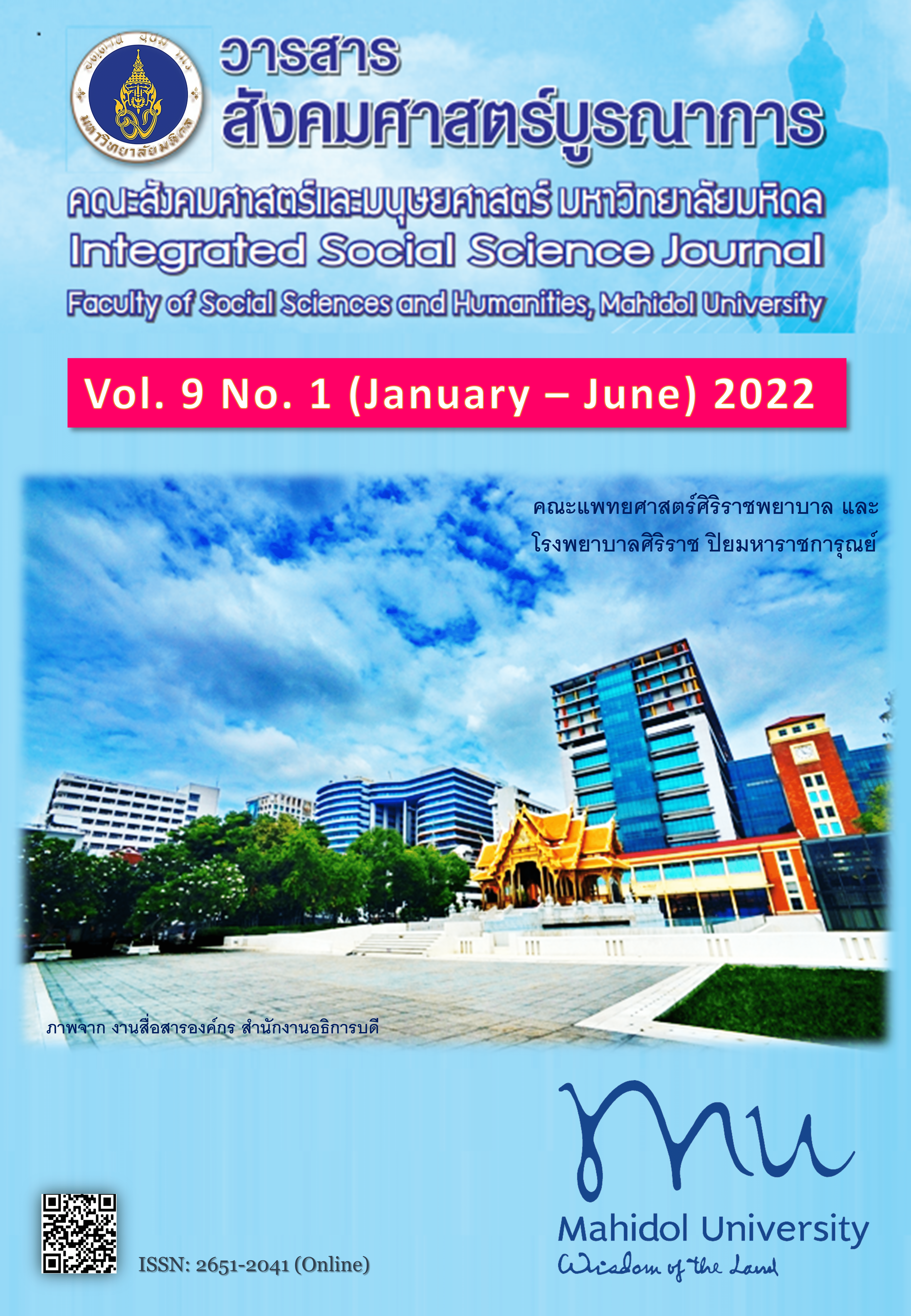การสร้างโอกาส ความเสมอภาค และความเท่าเทียมทางการศึกษาให้แก่คนไทยทุกช่วงวัย และการพัฒนาศักยภาพทุนมนุษย์ไทยในยุคดิจิทัล
Main Article Content
บทคัดย่อ
กรอบแนวคิดแผนการศึกษาแห่งชาติ พ.ศ. 2560 - 2579 ได้กำหนดวิสัยทัศน์ไว้ว่า “คนไทยทุกคนต้องได้รับการศึกษาและเรียนรู้ตลอดช่วงชีวิตอย่างมีคุณภาพ ดำรงชีวิตอย่างเป็นสุขสอดคล้องกับหลักปรัชญาของเศรษฐกิจพอเพียง และการเปลี่ยนแปลงของโลกศตวรรษที่ 21” และกำหนดยุทธศาสตร์การศึกษาของชาติไว้ 6 ยุทธศาสตร์ ได้แก่ ยุทธศาสตร์ที่ 1 การจัดการศึกษาเพื่อความมั่นคงของสังคมและประเทศชาติ ยุทธศาสตร์ที่ 2 การผลิตและพัฒนากำลังคน การวิจัยและนวัตกรรม เพื่อสร้างขีดความสามารถในการแข่งขันของประเทศ ยุทธศาสตร์ที่ 3 การพัฒนาศักยภาพคนทุกช่วงวัย และการสร้างสังคมแห่งการเรียนรู้ ยุทธศาสตร์ที่ 4 การสร้างโอกาส ความเสมอภาค และความเท่าเทียมทางการศึกษา ยุทธศาสตร์ที่ 5 การจัดการศึกษาเพื่อสร้างเสริมคุณภาพชีวิตที่เป็นมิตรกับสิ่งแวดล้อม และยุทธศาสตร์ที่ 6 การพัฒนาประสิทธิภาพของระบบบริหารจัดการศึกษา บทความนี้ให้ความสำคัญกับยุทธศาสตร์การศึกษาของชาติที่ 4 การสร้างโอกาส ความเสมอภาค และความเท่าเทียมทางการศึกษา โดยแบ่งหัวข้อในการนำเสนอออกเป็น 5 ส่วน คือ ส่วนแรกจะกล่าวถึงความเป็นมาและนโยบายในการสร้างโอกาส ความเสมอภาค และความเท่าเทียมทางการศึกษาขององค์การระหว่างประเทศ และของประเทศในกลุ่มสหภาพยุโรป ประเทศในกลุ่มเอเชียและแปซิฟิก และประเทศในกลุ่ม E9 ส่วนที่สองจะกล่าวถึงนโยบายการสร้างโอกาส ความเสมอภาค และความเท่าเทียมทางการศึกษาทุกช่วงวัยของประเทศไทย ส่วนที่ 3 จะกล่าวถึงการพัฒนาทุนมนุษย์ทุกช่วงวัยด้วยการศึกษาของประเทศไทย ส่วนที่ 4 จะเป็นข้อเสนอแนะในการจัดการศึกษาเพื่อสร้างโอกาส ความเสมอภาค และความเท่าเทียมทางการศึกษาทุกช่วงวัยของคนไทย และส่วนสุดท้ายจะเป็นข้อเสนอแนะในประยุกต์ใช้เทคโนโลยีดิจิทัลเพื่อการการพัฒนาทุนมนุษย์ของชาติ
Article Details

อนุญาตภายใต้เงื่อนไข Creative Commons Attribution-NonCommercial-NoDerivatives 4.0 International License.
- วารสารสังคมศาสตร์บูรณาการ มหาวิทยาลัยมหิดล อนุญาตให้สามารถนำไฟล์บทความไปใช้ประโยชน์และเผยแพร่ต่อได้ โดยอยู่ภายใต้เงื่อนไขสัญญาอนุญาต CC Attribution-NonCommercial-NoDerivatives 4.0 International (CC BY-NC-ND 4.0) โดยต้องแสดงที่มา/การอ้างอิงจากวารสาร – ไม่ใช้เพื่อการค้า – ห้ามแก้ไขดัดแปลงเนื้อหา
- ข้อความที่ปรากฏในบทความในวารสารฯ เป็นความคิดเห็นส่วนตัวของผู้เขียนแต่ละท่าน ไม่เกี่ยวข้องกับกองบรรณาธิการวารสารฯ (ซึ่งหมายรวมถึง บรรณาธิการ ผู้ทรงคุณวุฒิในกองบรรณาธิการ หรือ บรรณาธิการรับเชิญ) แต่อย่างใด ความรับผิดชอบองค์ประกอบทั้งหมดของบทความแต่ละเรื่องเป็นของผู้เขียนแต่ละท่าน หากมีความผิดพลาดใด ๆ ผู้เขียนแต่ละท่านจะรับผิดชอบบทความของตนเอง ตลอดจนความรับผิดชอบด้านเนื้อหาและการตรวจร่างบทความเป็นของผู้เขียน ไม่เกี่ยวข้องกับกองบรรณาธิการวารสารฯ
- กองบรรณาธิการขอสงวนสิทธิ์ในการตัดทอน/ปรับแก้ถ้อยคำบางประการเพื่อความเหมาะสม
เอกสารอ้างอิง
กระทรวงศึกษาธิการ. (2565). ประกาศกระทรวงศึกษาธิการ เรื่อง นโยบายและจุดเน้นของกระทรวงศึกษาธิการ ประจำปีงบประมาณ พ.ศ. 2565 และ 2566. https://moe360.blog/2022/01/19/policy-and-focus-moe/
เกรียงไกร เจริญธนาวัฒน์. (2548). หลักความเสมอภาค. http://www.public-law.net/ publaw/view.aspx?id=657
ทีปกร จิร์ฐิติกุลชัย. (2560). แนวคิดและประสบการณ์จากต่างประเทศในการปฏิรูปการศึกษา. https://theepakornblog.wordpress.com/2017/02/02/first-blog-post/
รัฐธรรมนูญแห่งราชอาณาจักรไทย พุทธศักราช 2550.
รัฐธรรมนูญแห่งราชอาณาจักรไทย พุทธศักราช 2560.
สำนักงานเลขาธิการสภาการศึกษา. (2560). แผนการศึกษาแห่งชาติ พ.ศ. 2560 - 2579. บริษัท พริกหวานกราฟฟิค จำกัด.
สำนักงานเลขาธิการสภาการศึกษา. (2560). รายงานการวิจัย เรื่อง ความทั่วถึงและเท่าเทียมของการจัดการศึกษาในสถานศึกษาขั้นพื้นฐาน. บริษัท 21 เซ็นจูรี่ จำกัด.
สำนักงานสภาพัฒนาการเศรษฐกิจและสังคมแห่งชาติ. (2562). แผนแม่บทภายใต้ยุทธศาสตร์ชาติ (11) การพัฒนาศักยภาพคนตลอดช่วงชีวิต (พ.ศ. 2561 – 2580). http://nscr.nesdb. go.th/wp-content/uploads/2019/04/11-ศักยภาพคนตลอดช่วงชีวิต.pdf
สุพริศร์ สุวรรณิก. (2565). การพัฒนา “ทุนมนุษย์” ด้วย Mentorship Program. https://www.thairath.co.th/business/feature/2299880
สุริยา ฆ้องเสนาะ. (2560). การจัดการศึกษาเด็กเล็กให้เป็นไปตามรัฐธรรมนูญแห่งราชอาณาจักรไทย พุทธศักราช 2560. https://www.parliament.go.th/ewtadmin/ewt/ parliament_parcy/ewt_dl_link.php?nid=42029
สยามรัฐออนไลน์. (2563). “TalentMind” ก้าวสู่ดิจิทัล สู่การจัดการทรัพยากรมนุษย์แห่งอนาคต. https://siamrath.co.th/n/139410
อภิวัฒน์ สุดสาว. (2554). หลักความเสมอภาคภายใต้รัฐธรรมนูญแห่งราชอาณาจักรไทย. https://www.senate.go.th/assets/portals/93/fileups/272/files/S%E0%B9%88ub_Jun/8think/think16.pdf
UNESCO. (2009). Towards inclusive education for children with disabilities: A guideline. https://unesdoc.unesco.org/ark:/48223/pf0000192480_eng


